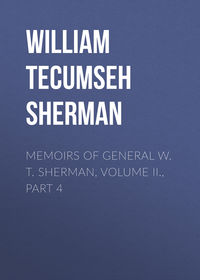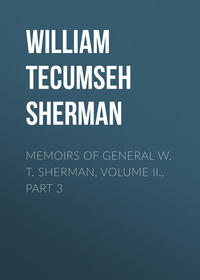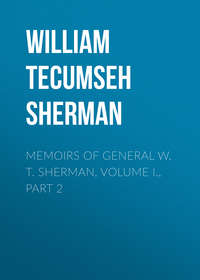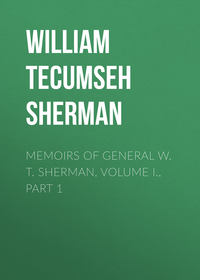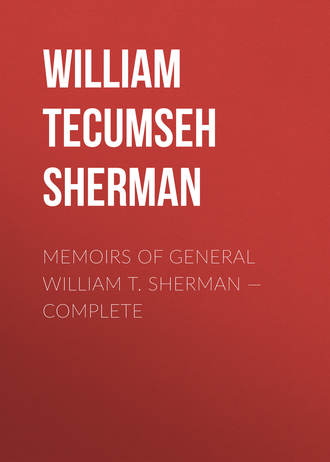 полная версия
полная версияMemoirs of General William T. Sherman — Complete
I invested my earnings in this survey in three lots in Sacramento City, on which I made a fair profit by a sale to one McNulty, of Mansfield, Ohio. I only had a two months' leave of absence, during which General Smith, his staff, and a retinue of civil friends, were making a tour of the gold-mines, and hearing that he was en route back to his headquarters at Sonoma, I knocked off my work, sold my instruments, and left my wagon and mules with my cousin Charley Hoyt, who had a store in Sacramento, and was on the point of moving up to a ranch, for which he had bargained, on Bear Creek, on which was afterward established Camp "Far West." He afterward sold the mules, wagon, etc., for me, and on the whole I think I cleared, by those two months' work, about six thousand dollars. I then returned to headquarters at Sonoma, in time to attend my fellow aide-de-camp Gibbs through a long and dangerous sickness, during which he was on board a store-ship, guarded by Captain George Johnson, who now resides in San Francisco. General Smith had agreed that on the first good opportunity he would send me to the United States as a bearer of dispatches, but this he could not do until he had made the examination of Oregon, which was also in his command. During the summer of 1849 there continued to pour into California a perfect stream of people. Steamers came, and a line was established from San Francisco to Sacramento, of which the Senator was the pioneer, charging sixteen dollars a passage, and actually coining money. Other boats were built out of materials which had either come around Cape Horn or were brought from the Sandwich Islands. Wharves were built, houses were springing up as if by magic, and the Bay of San Francisco presented as busy a scene of life as any part of the world. Major Allen, of the Quartermaster's Department, who had come out as chief-quartermaster of the division, was building a large warehouse at Benicia, with a row of quarters, out of lumber at one hundred dollars per thousand feet, and the work was done by men at sixteen dollars a day. I have seen a detailed soldier, who got only his monthly pay of eight dollars a month, and twenty cents a day for extra duty, nailing on weather-boards and shingles, alongside a citizen who was paid sixteen dollars a day. This was a real injustice, made the soldiers discontented, and it was hardly to be wondered at that so many deserted.
While the mass of people were busy at gold and in mammoth speculations, a set of busy politicians were at work to secure the prizes of civil government. Gwin and Fremont were there, and T. Butler King, of Georgia, had come out from the East, scheming for office. He staid with us at Sonoma, and was generally regarded as the Government candidate for United States Senator. General Riley as Governor, and Captain Halleck as Secretary of State, had issued a proclamation for the election of a convention to frame a State constitution. In due time the elections were held, and the convention was assembled at Monterey. Dr. Semple was elected president; and Gwin, Sutter, Halleck, Butler King, Sherwood, Gilbert, Shannon, and others, were members. General Smith took no part in this convention, but sent me down to watch the proceedings, and report to him. The only subject of interest was the slavery question. There were no slaves then in California, save a few who had come out as servants, but the Southern people at that time claimed their share of territory, out of that acquired by the common labors of all sections of the Union in the war with Mexico. Still, in California there was little feeling on the subject. I never heard General Smith, who was a Louisianian, express any opinion about it. Nor did Butler King, of Georgia, ever manifest any particular interest in the matter. A committee was named to draft a constitution, which in due time was reported, with the usual clause, then known as the Wilmot Proviso, excluding slavery; and during the debate which ensued very little opposition was made to this clause, which was finally adopted by a large majority, although the convention was made up in large part of men from our Southern States. This matter of California being a free State, afterward, in the national Congress, gave rise to angry debates, which at one time threatened civil war. The result of the convention was the election of State officers, and of the Legislature which sat in San Jose in October and November, 1849, and which elected Fremont and Gwin as the first United States Senators in Congress from the Pacific coast.
Shortly after returning from Monterey, I was sent by General Smith up to Sacramento City to instruct Lieutenants Warner and Williamson, of the Engineers, to push their surveys of the Sierra Nevada Mountains, for the purpose of ascertaining the possibility of passing that range by a railroad, a subject that then elicited universal interest. It was generally assumed that such a road could not be made along any of the immigrant roads then in use, and Warner's orders were to look farther north up the Feather River, or some one of its tributaries. Warner was engaged in this survey during the summer and fall of 1849, and had explored, to the very end of Goose Lake, the source of Feather River. Then, leaving Williamson with the baggage and part of the men, he took about ten men and a first-rate guide, crossed the summit to the east, and had turned south, having the range of mountains on his right hand, with the intention of regaining his camp by another pass in the mountain. The party was strung out, single file, with wide spaces between, Warner ahead. He had just crossed a small valley and ascended one of the spurs covered with sage-brush and rocks, when a band of Indians rose up and poured in a shower of arrows. The mule turned and ran back to the valley, where Warner fell off dead, punctured by five arrows. The mule also died. The guide, who was near to Warner, was mortally wounded; and one or two men had arrows in their bodies, but recovered. The party gathered about Warner's body, in sight of the Indians, who whooped and yelled, but did not venture away from their cover of rocks. This party of men remained there all day without burying the bodies, and at night, by a wide circuit, passed the mountain, and reached Williamson's camp. The news of Warner's death cast a gloom over all the old Californians, who knew him well. He was a careful, prudent, and honest officer, well qualified for his business, and extremely accurate in all his work. He and I had been intimately associated during our four years together in California, and I felt his loss deeply. The season was then too far advanced to attempt to avenge his death, and it was not until the next spring that a party was sent out to gather up and bury his scattered bones.
As winter approached, the immigrants overland came pouring into California, dusty and worn with their two thousand miles of weary travel across the plains and mountains. Those who arrived in October and November reported thousands still behind them, with oxen perishing, and short of food. Appeals were made for help, and General Smith resolved to attempt relief. Major Rucker, who had come across with Pike. Graham's Battalion of Dragoons, had exchanged with Major Fitzgerald, of the Quartermaster's Department, and was detailed to conduct this relief. General Smith ordered him to be supplied with one hundred thousand dollars out of the civil fund, subject to his control, and with this to purchase at Sacramento flour, bacon, etc., and to hire men and mules to send out and meet the immigrants. Major Rucker fulfilled this duty perfectly, sending out pack-trains loaded with food by the many routes by which the immigrants were known to be approaching, went out himself with one of these trains, and remained in the mountains until the last immigrant had got in. No doubt this expedition saved many a life which has since been most useful to the country. I remained at Sacramento a good part of the fall of 1849, recognizing among the immigrants many of my old personal friends—John C. Fall, William King, Sam Stambaugh, Hugh Ewing, Hampton Denman, etc. I got Rucker to give these last two employment along with the train for the relief of the immigrants. They had proposed to begin a ranch on my land on the Cosumnes, but afterward changed their minds, and went out with Rucker.
While I was at Sacramento General Smith had gone on his contemplated trip to Oregon, and promised that he would be back in December, when he would send me home with dispatches. Accordingly, as the winter and rainy season was at hand, I went to San Francisco, and spent some time at the Presidio, waiting patiently for General Smith's return. About Christmas a vessel arrived from Oregon with the dispatches, and an order for me to deliver them in person to General Winfield Scott, in New York City. General Smith had sent them down, remaining in Oregon for a time. Of course I was all ready, and others of our set were going home by the same conveyance, viz., Rucker, Ord, A. J. Smith—some under orders, and the others on leave. Wanting to see my old friends in Monterey, I arranged for my passage in the steamer of January 1, 1850, paying six hundred dollars for passage to New York, and went down to Monterey by land, Rucker accompanying me. The weather was unusually rainy, and all the plain about Santa Clara was under water; but we reached Monterey in time. I again was welcomed by my friends, Dona Augustias, Manuelita, and the family, and it was resolved that I should take two of the boys home with me and put them at Georgetown College for education, viz., Antonio and Porfirio, thirteen and eleven years old. The dona gave me a bag of gold-dust to pay for their passage and to deposit at the college. On the 2d day of January punctually appeared the steamer Oregon.
We were all soon on board and off for home. At that time the steamers touched at San Diego, Acapulco, and Panama. Our passage down the coast was unusually pleasant. Arrived at Panama, we hired mules and rode across to Gorgona, on the Cruces River, where we hired a boat and paddled down to the mouth of the river, off which lay the steamer Crescent City. It usually took four days to cross the isthmus, every passenger taking care of himself, and it was really funny to watch the efforts of women and men unaccustomed to mules. It was an old song to us, and the trip across was easy and interesting. In due time we were rowed off to the Crescent City, rolling back and forth in the swell, and we scrambled aboard by a "Jacob's ladder" from the stern. Some of the women had to be hoisted aboard by lowering a tub from the end of a boom; fun to us who looked on, but awkward enough to the poor women, especially to a very fat one, who attracted much notice. General Fremont, wife and child (Lillie) were passengers with us down from San Francisco; but Mrs. Fremont not being well, they remained over one trip at Panama.
Senator Gwin was one of our passengers, and went through to New York. We reached New York about the close of January, after a safe and pleasant trip. Our party, composed of Ord, A. J. Smith, and Rucker, with the two boys, Antonio and Porfirio, put up at Delmonico's, on Bowling Green; and, as soon as we had cleaned up somewhat, I took a carriage, went to General Scott's office in Ninth Street, delivered my dispatches, was ordered to dine with him next day, and then went forth to hunt up my old friends and relations, the Scotts, Hoyts, etc., etc.
On reaching New York, most of us had rough soldier's clothing, but we soon got a new outfit, and I dined with General Scott's family, Mrs. Scott being present, and also their son-in-law and daughter (Colonel and Mrs. H. L. Scott). The general questioned me pretty closely in regard to things on the Pacific coast, especially the politics, and startled me with the assertion that "our country was on the eve of a terrible civil war." He interested me by anecdotes of my old army comrades in his recent battles around the city of Mexico, and I felt deeply the fact that our country had passed through a foreign war, that my comrades had fought great battles, and yet I had not heard a hostile shot. Of course, I thought it the last and only chance in my day, and that my career as a soldier was at an end. After some four or five days spent in New York, I was, by an order of General Scott, sent to Washington, to lay before the Secretary of War (Crawford, of Georgia) the dispatches which I had brought from California. On reaching Washington, I found that Mr. Ewing was Secretary of the Interior, and I at once became a member of his family. The family occupied the house of Mr. Blair, on Pennsylvania Avenue, directly in front of the War Department. I immediately repaired to the War Department, and placed my dispatches in the hands of Mr. Crawford, who questioned me somewhat about California, but seemed little interested in the subject, except so far as it related to slavery and the routes through Texas. I then went to call on the President at the White House. I found Major Bliss, who had been my teacher in mathematics at West Point, and was then General Taylor's son-in-law and private secretary. He took me into the room, now used by the President's private secretaries, where President Taylor was. I had never seen him before, though I had served under him in Florida in 1840-'41, and was most agreeably surprised at his fine personal appearance, and his pleasant, easy manners. He received me with great kindness, told me that Colonel Mason had mentioned my name with praise, and that he would be pleased to do me any act of favor. We were with him nearly an hour, talking about California generally, and of his personal friends, Persifer Smith, Riley, Canby, and others: Although General Scott was generally regarded by the army as the most accomplished soldier of the Mexican War, yet General Taylor had that blunt, honest, and stern character, that endeared him to the masses of the people, and made him President. Bliss, too, had gained a large fame by his marked skill and intelligence as an adjutant-general and military adviser. His manner was very unmilitary, and in his talk he stammered and hesitated, so as to make an unfavorable impression on a stranger; but he was wonderfully accurate and skillful with his pen, and his orders and letters form a model of military precision and clearness.
CHAPTER IV.
MISSOURI, LOUISIANA, AND CALIFORNIA
1850-1855Having returned from California in January, 1850, with dispatches for the War Department, and having delivered them in person first to General Scott in New York City, and afterward to the Secretary of War (Crawford) in Washington City, I applied for and received a leave of absence for six months. I first visited my mother, then living at Mansfield, Ohio, and returned to Washington, where, on the 1st day of May, 1850, I was married to Miss Ellen Boyle Ewing, daughter of the Hon. Thomas Ewing, Secretary of the Interior. The marriage ceremony was attended by a large and distinguished company, embracing Daniel Webster, Henry Clay, T. H. Benton, President Taylor, and all his cabinet. This occurred at the house of Mr. Ewing, the same now owned and occupied by Mr. F. P. Blair, senior, on Pennsylvania Avenue, opposite the War Department. We made a wedding tour to Baltimore, New York, Niagara, and Ohio, and returned to Washington by the 1st of July. General Taylor participated in the celebration of the Fourth of July, a very hot day, by hearing a long speech from the Hon. Henry S. Foote, at the base of the Washington Monument. Returning from the celebration much heated and fatigued, he partook too freely of his favorite iced milk with cherries, and during that night was seized with a severe colic, which by morning had quite prostrated him. It was said that he sent for his son-in-law, Surgeon Wood, United States Army, stationed in Baltimore, and declined medical assistance from anybody else. Mr. Ewing visited him several times, and was manifestly uneasy and anxious, as was also his son-in-law, Major Bliss, then of the army, and his confidential secretary. He rapidly grew worse, and died in about four days.
At that time there was a high state of political feeling pervading the country, on account of the questions growing out of the new Territories just acquired from Mexico by the war. Congress was in session, and General Taylor's sudden death evidently created great alarm. I was present in the Senate-gallery, and saw the oath of office administered to the Vice-President, Mr. Fillmore, a man of splendid physical proportions and commanding appearance; but on the faces of Senators and people could easily be read the feelings of doubt and uncertainty that prevailed. All knew that a change in the cabinet and general policy was likely to result, but at the time it was supposed that Mr. Fillmore, whose home was in Buffalo, would be less liberal than General Taylor to the politicians of the South, who feared, or pretended to fear, a crusade against slavery; or, as was the political cry of the day, that slavery would be prohibited in the Territories and in the places exclusively under the jurisdiction of the United States. Events, however, proved the contrary.
I attended General Taylor's funeral as a sort of aide-decamp, at the request of the Adjutant-General of the army, Roger Jones, whose brother, a militia-general, commanded the escort, composed of militia and some regulars. Among the regulars I recall the names of Captains John Sedgwick and W. F. Barry.
Hardly was General Taylor decently buried in the Congressional Cemetery when the political struggle recommenced, and it became manifest that Mr. Fillmore favored the general compromise then known as Henry Clay's "Omnibus Bill," and that a general change of cabinet would at once occur: Webster was to succeed Mr. Clayton as Secretary of State, Corwin to succeed Mr. Meredith as Secretary of the Treasury, and A. H. H. Stuart to succeed Mr. Ewing as Secretary of the Interior. Mr. Ewing, however, was immediately appointed by the Governor of the State to succeed Corwin in the Senate. These changes made it necessary for Mr. Ewing to discontinue house-keeping, and Mr. Corwin took his home and furniture off his hands. I escorted the family out to their home in Lancaster, Ohio; but, before this had occurred, some most interesting debates took place in the Senate, which I regularly attended, and heard Clay, Benton, Foots, King of Alabama, Dayton, and the many real orators of that day. Mr. Calhoun was in his seat, but he was evidently approaching his end, for he was pale and feeble in the extreme. I heard Mr. Webster's last speech on the floor of the Senate, under circumstances that warrant a description. It was publicly known that he was to leave the Senate, and enter the new cabinet of Mr. Fillmore, as his Secretary of State, and that prior to leaving he was to make a great speech on the "Omnibus Bill." Resolved to hear it, I went up to the Capitol on the day named, an hour or so earlier than usual. The speech was to be delivered in the old Senate-chamber, now used by the Supreme Court. The galleries were much smaller than at present, and I found them full to overflowing, with a dense crowd about the door, struggling to reach the stairs. I could not get near, and then tried the reporters' gallery, but found it equally crowded; so I feared I should lose the only possible opportunity to hear Mr. Webster.
I had only a limited personal acquaintance with any of the Senators, but had met Mr. Corwin quite often at Mr. Ewing's house, and I also knew that he had been extremely friendly to my father in his lifetime; so I ventured to send in to him my card, "W. T. S., First-Lieutenant, Third Artillery." He came to the door promptly, when I said, "Mr. Corwin, I believe Mr. Webster is to speak to-day." His answer was, "Yes, he has the floor at one o'clock." I then added that I was extremely anxious to hear him. "Well," said he, "why don't you go into the gallery?" I explained that it was full, and I had tried every access, but found all jammed with people. "Well," said he, "what do you want of me?" I explained that I would like him to take me on the floor of the Senate; that I had often seen from the gallery persons on the floor, no better entitled to it than I. He then asked in his quizzical way, "Are you a foreign embassador?" "No." "Are you the Governor of a State?" "No." "Are you a member of the other House?" "Certainly not" "Have you ever had a vote of thanks by name?" "No!" "Well, these are the only privileged members." I then told him he knew well enough who I was, and that if he chose he could take me in. He then said, "Have you any impudence?" I told him, "A reasonable amount if occasion called for it." "Do you think you could become so interested in my conversation as not to notice the door-keeper?" (pointing to him). I told him that there was not the least doubt of it, if he would tell me one of his funny stories. He then took my arm, and led me a turn in the vestibule, talking about some indifferent matter, but all the time directing my looks to his left hand, toward which he was gesticulating with his right; and thus we approached the door-keeper, who began asking me, "Foreign ambassador? Governor of a State? Member of Congress?" etc.; but I caught Corwin's eye, which said plainly, "Don't mind him, pay attention to me," and in this way we entered the Senate-chamber by a side-door. Once in, Corwin said, "Now you can take care of yourself," and I thanked him cordially.
I found a seat close behind Mr. Webster, and near General Scott, and heard the whole of the speech. It was heavy in the extreme, and I confess that I was disappointed and tired long before it was finished. No doubt the speech was full of fact and argument, but it had none of the fire of oratory, or intensity of feeling, that marked all of Mr. Clay's efforts.
Toward the end of July, as before stated, all the family went home to Lancaster. Congress was still in session, and the bill adding four captains to the Commissary Department had not passed, but was reasonably certain to, and I was equally sure of being one of them. At that time my name was on the muster-roll of (Light) Company C, Third Artillery (Bragg's), stationed at Jefferson Barracks, near St. Louis. But, as there was cholera at St. Louis, on application, I was permitted to delay joining my company until September. Early in that month, I proceeded to Cincinnati, and thence by steamboat to St. Louis, and then to Jefferson Barracks, where I reported for duty to Captain and Brevet-Colonel Braxton Bragg, commanding (Light) Company C, Third Artillery. The other officers of the company were First-Lieutenant James A. Hardie, and afterward Haekaliah Brown. New horses had just been purchased for the battery, and we were preparing for work, when the mail brought the orders announcing the passage of the bill increasing the Commissary Department by four captains, to which were promoted Captains Shiras, Blair, Sherman, and Bowen. I was ordered to take post at St. Louis, and to relieve Captain A. J. Smith, First Dragoons, who had been acting in that capacity for some months. My commission bore date September 27,1850. I proceeded forthwith to the city, relieved Captain Smith, and entered on the discharge of the duties of the office.
Colonel N. S. Clarke, Sixth Infantry, commanded the department; Major D. C. Buell was adjutant-general, and Captain W. S. Hancock was regimental quartermaster; Colonel Thomas Swords was the depot quartermaster, and we had our offices in the same building, on the corner of Washington Avenue and Second. Subsequently Major S. Van Vliet relieved Colonel Swords. I remained at the Planters' House until my family arrived, when we occupied a house on Chouteau Avenue, near Twelfth.
During the spring and summer of 1851, Mr. Ewing and Mr. Henry Stoddard, of Dayton, Ohio, a cousin of my father, were much in St. Louis, on business connected with the estate of Major Amos Stoddard, who was of the old army, as early as the beginning of this century. He was stationed at the village of St. Louis at the time of the Louisiana purchase, and when Lewis and Clarke made their famous expedition across the continent to the Columbia River. Major Stoddard at that early day had purchased a small farm back of the village, of some Spaniard or Frenchman, but, as he was a bachelor, and was killed at Fort Meigs, Ohio, during the War of 1812, the title was for many years lost sight of, and the farm was covered over by other claims and by occupants. As St. Louis began to grow, his brothers and sisters, and their descendants, concluded to look up the property. After much and fruitless litigation, they at last retained Mr. Stoddard, of Dayton, who in turn employed Mr. Ewing, and these, after many years of labor, established the title, and in the summer of 1851 they were put in possession by the United States marshal. The ground was laid off, the city survey extended over it, and the whole was sold in partition. I made some purchases, and acquired an interest, which I have retained more or less ever since.


